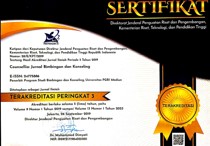Intensitas penggunaan smartphone, prokrastinasi akademik, dan perilaku phubbing Mahasiswa
Abstract
Penelitian ini bertujuan untuk melihat pengaruh intensitas penggunaan smartphone terhadap prokrastinasi akademik mahasiswa dan perilaku phubbing mahasiswa secara simultan dan parsial. Jumlah sampel sebesar 103 dengan accidental sampling dari Program Studi Psikologi Islam IAIN Pontianak. Kuesioner digunakan sebagai instumen penelitian dengan menggunakan Skala Likert. Analisis data menggunakan uji statistik multivariate analysis of variance. Hasil penelitian sebagai berikut: 1). Ada pengaruh intensitas penggunaan smartphone terhadap perilaku prokrastinasi akademik dan perilaku phubbing mahasiswa secara simultan (F=2,838; 0,026<0.05), 2). Intensitas penggunaan smartphone mempengaruhi prokrastinasi akademik mahasiswa sebesar (F=3,990; 0,022<0,05), 3). Intensitas penggunaan smartphone mempengaruhi perilaku phubbing (F=4,511; 0,013<0,05). Peneliti memberikan wacana solusi atas hasil hipotesis diatas pertama, perlunya memberikan arahan yang baik dalam penggunaan smartphone di kalangan mahasiswa. Kedua, pihak fakultas ataupun program studi sedapat mungkin menempatkan motivasi sebagai prioritas dalam pembelajaran selama perkuliahan. Ketiga, perlunya untuk menyediakan layanan bimbingan konseling kepada mahasiswa, secara berkala dan terbuka bagi mereka yang mengalami perilaku negatif yang dapat mengganggu aktivitas akademik mahasiswa.
Abstract: The study aims to see the influence of smartphone usage intensity against student academic procrastination and the simultaneous and partial conduct of student phubbing. The sample amount is 103 with accidental sampling from IAIN Pontianak Islamic Psychology Study Program. Questionnaires were used as research instruments using the Likert scale. Data analysis using multivariate analysis of variance statistical test. The results of the study as follows: 1). There is an impact on the use of smartphone against the behavior of academic procrastination and conduct of student phubbing simultaneously (F=2,838; 0,026<0.05), 2). The intensity of smartphone usage affects the student's academic procrastination (F = 3,990; 0,022 < 0.05), 3). The intensity of smartphone usage affects phubbing behavior (F = 4,511; 0,013 < 0.05). Researchers provide a solution to the above-first hypothesis results, the need to provide good direction in the use of smartphones among students. Secondly, the faculty or the study program can put motivation as a priority in learning during the lecture. Thirdly, the need to provide counseling services to students, periodically and openly for those who experience negative behaviors that can interfere with student's academic activitiesKeywords
Full Text:
PDFReferences
Aljomaa, S. S., Mohammad, M. F., Albursan, I. S., Bakhiet, S. F., & Abduljabbar, A. S. (2016). Smartphone Addiction Among University Students In The Light Of Some Variables. Computers in Human Behavior, 61, 155–164. https://doi.org/10.1016/j.chb.2016.03.041
Anggunani, A. R., & Purwanto, B. (2019). Hubungan antara Problematic Internet Use dengan Prokrastinasi Akademik. Gadjah Mada Journal of Psychology (GamaJoP), 4(1), 1. https://doi.org/10.22146/gamajop.45399
Ardi, B. K. &, & Subchan. (2015). Peranan Perkembangan Aplikasi Smartphone Terhadap Pelayanan Parbankan Di Indonesia. Jurnal Ekonomi Manajemen Akuntansi, 21(37), 1–14.
Aziz, A. (2019). No Mobile Phone Phobia dikalangan Mahasiswa Pascasarjana. KONSELI: Jurnal Bimbingan Dan Konseling (E-Journal), 6(1), 1–10. https://doi.org/10.24042/kons.v6i1.3864
Backer, E. (2010). Using smartphones and Facebook in a major assessment: The student experience. (January 2010). Retrieved from http://www.ejbest.org
Basri, A. S. H. (2018). Prokrastinasi Akademik Mahasiswa Ditinjau Dari Religiusitas. Hisbah: Jurnal Bimbingan Konseling Dan Dakwah Islam, 14(2). https://doi.org/10.14421/hisbah.2017.142-05
Beard, K. W., & Wolf, E. M. (2001). Modification in the Proposed Diagnostic Criteria for Internet Addiction. Cyberpshycology & Behavior, 4(3), 377–383. https://doi.org/10.1089/109493101300210286
Boham, A., & Rondonuwu, S. A. (2017). Penggunaan Smartphone Dalam Menunjang Aktivitas Perkuliahan Oleh Mahasiswa Fispol Unsrat Manado. E-Journal Acta Diurna, VI(2), 1–15.
Chotpitayasunondh, V., & Douglas, K. M. (2018). The effects of “phubbing” on social interaction. Journal of Applied Social Psychology, 48(6), 304–316. https://doi.org/10.1111/jasp.12506
David, M. E., & Roberts, J. A. (2017). Phubbed and Alone: Phone Snubbing, Social Exclusion, and Attachment to Social Media. Journal of the Association for Consumer Research. https://doi.org/10.1086/690940
Davis, R. A. (2001). Cognitive-behavioral model of pathological Internet use. Computers in Human Behavior, 17(2), 187–195. https://doi.org/10.1016/S0747-5632(00)00041-8
Demirci, K., Akgönül, M., & Akpinar, A. (2015). Relationship of smartphone use severity with sleep quality, depression, and anxiety in university students. Journal of Behavioral Addictions. https://doi.org/10.1556/2006.4.2015.010
Dluha, M. S. (2016). Pengaruh Perfeksionisme, Achievment Goal Orientastion dan Jenis Kelamin Terhadap prokrastinasi Akademik Mahasiswa. (Skripsi, Universitas Islam Negeri Syarif Hidayatullah)
Ernawati, E., & Sumarwoto, V. D. (2016). Efektivitas Layanan Konseling Kelompok Dengan Pendekatan Behavioral Melalui Teknik Shaping Untuk Mengurangi Prokrastinasi Akademik Siswa Kelas Viii Smp Negeri 2 Barat Kabupaten Magetan. Counsellia: Jurnal Bimbingan Dan Konseling, 6(1), 41. https://doi.org/10.25273/counsellia.v6i1.456
Fauzan, A. A. (2018). Analisis Psikometrik Instrumen Phubbing dan Faktor-Faktor yang Mempengaruhinya. Psikologi, 19–20. (Skripsi, Universitas Islam Negeri Syarif Hidayatullah)
Fauziah, H. H. (2016). Fakor-Faktor Yang Mempengaruhi Prokrastinasi Akademik Pada Mahasiswa Fakultas Psikologi Uin Sunan Gunung Djati Bandung. Psympathic : Jurnal Ilmiah Psikologi, 2(2), 123–132. https://doi.org/10.15575/psy.v2i2.453
Gifary, S., & N. Kurnia, I. (2014). Intensitas Penggunaan Smartphone Terhadap Perilaku Komunikasi. Jurnal Sosioteknologi, 14(2). https://doi.org/http://dx.doi.org/10.5614%2Fsostek.itbj.2015.14.2.7
Gultom, S. A., Wardani, N. D., & Fitrikasari, A. (2018). Hubungan Adiksi Internet Dengan Prokrastinasi Akademik. Jurnal Kedokteran Diponegoro, 7(1), 330–347. https://doi.org/http://ejournal3.undip.ac.id/index.php/medico
Haomasan, P., & Nofharina, N. (2018). Pengaruh Penggunaan Smartphone Tehadap Pola Komunikasi Interpesonal Siswa Smp Negeri 50 Bandung. Jurnal Komunikasi, 12(1), 1–7. https://doi.org/10.21107/ilkom.v12i1.3710
Hayyinah, H. (2004). Religiusitas dan Prokrastinasi Akademik Mahasiswa. Psikologika : Jurnal Pemikiran Dan Penelitian Psikologi, 9(17). https://doi.org/10.20885/psikologika.vol9.iss17.art3
Hendriyani, T. (2019). Optimalisasi peran Guru Bimbingan dan Konseling Dalam Mereduksi Nomphobia. 123–126.
Hooda, M., & Devi, R. (2017). Procrastination: A Serious Problem Prevalent Among Adolescents. International Journal of Multidisciplinary Research, 7(9), 107–113.
Kadafi, A., Mardiyah, R. ramatus, & Rahmawati, N. K. D. (2018). Upaya Menurunkan Prokrastinasi Akademik Mahasiswa Melalui Bimbingan Konseling Islam. Jurnal Edukasi: Jurnal Bimbingan Konseling, 04(September), 181–193.
Karadağ, E., Tosuntaş, Ş. B., Erzen, E., Duru, P., Bostan, N., Mızrak Şahin, B., … Babadağ, B. (2016). The Virtual World’s Current Addiction: Phubbing. Addicta: The Turkish Journal on Addictions. https://doi.org/10.15805/addicta.2016.3.0013
Kartowagiran, B. (2015). Pendekatan Kualitatif dan Pendekatan Kuantitatif Dalam Penelitian Tindakan di Bidang Psikologi. Retrieved from https://www.google.com/url?sa=t&rct=j&q=&esrc=s&source=web&cd=3&cad=rja&uact=8&ved=2ahUKEwjhos2xlpzpAhVLU30KHRVPDwEQFjACegQIAxAB&url=http%3A%2F%2Fstaff.uny.ac.id%2Fsites%2Fdefault%2Ffiles%2F14-PENDEKATAN%2520KUANTITATIF.pdf&usg=AOvVaw0aurhSy_CXK5UxiSwgm6w
Kusumawide, K. T., Saputra, W. N. E., Alhadi, S., & Prasetiawan, H. (2019). Keefektifan Solution Focused Brief Counseling (SFBC) untuk menurunkan perilaku prokrastinasi akademik siswa. Counsellia: Jurnal Bimbingan Dan Konseling, 9(2), 89. https://doi.org/10.25273/counsellia.v9i2.4618
Mahardika, D. (2014). Upaya Mengatasi Penyalahgunaan Gadget Dalam Proses Belajar Mengajar di Kelas X TKI-1 Dengan Konseling Kelompok Dengan Teknik Pengkondisian Eversi. (1).
Mandias, G. F. (2017). Analisis Pengaruh Pemanfaatan Smartphone Terhadap Prestasi Akademik Mahasiswa Fakultas Ilmu Komputer Universitas Klabat. CogITo Smart Journal, 3(1), 83. https://doi.org/10.31154/cogito.v3i1.47.83-90
Marsilia, & Mahmudi, H. I. (2015). Perubahan Perilaku Prokrastinasi Akademik Melalui Konseling Kelompok Dengan Teknik Token Ekonomi Pada Siswa Kelas X TP SMK Negeri 1 Wonosari Kabupaten Madiun. Counsellia: Jurnal Bimbingan Dan Konseling, 40–57.
Muflih, M., Hamzah, H., & Puniawan, W. A. (2017). Penggunaan Smartphone Dan Interaksi Sosial Pada Remaja Di Sma Negeri I Kalasan Sleman Yogyakarta. Idea Nursing Journal, 8(1), 12–18.
Muyana, S., & Dahlan, U. A. (2018). Prokrastinasi Akademik Dikalangan Mahasiswa Program Studi Bimbingan dan Konseling. Counsellia: Jurnal Bimbingan Dan Konseling, 8(1), 45–52. https://doi.org/10.25273/counsellia.v8i1.1868
Normawati, Maryam, S., & Priliantini, A. (2018). Pengaruh Kampanye “Let’S Disconnect To Connect” Terhadap Sikap Anti Phubbing (Survei Pada Followers Official Account Line Starbucks Indonesia). Jurnal Komunikasi, Media Dan Informatika, 7(3), 155–164.
Oktario, A. (2017). Hubungan antara Intensitas Penggunaan Smartphone dan Motivasi Berprestasi Pada Mahsiswa. 8(1), 28–48. (Skripsi, Universitas Sanata Dharma)
Ozdalga, E., Ozdalga, A., & Ahuja, N. (2012). The smartphone in medicine: A review of current and potential use among physicians and students. Journal of Medical Internet Research. https://doi.org/10.2196/jmir.1994
Rahmandani, F., Tinus, A., & Ibrahim, M. M. (2018). Analisis Dampak Penggunaan Gadget (Smartphone) Terhadap Kepribadian Dan Karakter (Kekar) Peserta Didik Di Sma Negeri 9 Malang. Jurnal Civic Hukum, 3(1), 18. https://doi.org/10.22219/jch.v3i1.7726
Ramaita, R., Armaita, A., & Vandelis, P. (2019). Hubungan Ketergantungan Smartphone Dengan Kecemasan (Nomophobia). Jurnal Kesehatan, 10(2), 89. https://doi.org/10.35730/jk.v10i2.399
Rosiyanti, H., & Muthmainnah, R. N. (2018). Penggunaan Gadget Sebagai Sumber Belajar Mempengaruhi Hasil Belajar Pada Mata Kuliah Matematika Dasar. FIBONACCI: Jurnal Pendidikan Matematika Dan Matematika, 4(1), 25–36. Retrieved from https://jurnal.umj.ac.id/index.php/fbc/article/view/2750/2360
Rudiana Marlia, P., Novita Azizah, M., & Ibnu, M. (2017). Islamic Counseling Untuk Nomophobia Di Kalangan Remaja. Prosiding Seminar Nasional Bimbingan Dan Konseling, 1(1), 189–194. Retrieved from file:///C:/Users/user/Downloads/134-267-1-SM.pdf
Samaha, M., & Hawi, N. S. (2016). Relationships among smartphone addiction, stress, academic performance, and satisfaction with life. Computers in Human Behavior, 57, 321–325. https://doi.org/10.1016/j.chb.2015.12.045
Sariani, D. (2014). Pengaruh Penggunaan Smartphone Terhadap Komunikasi Interpersonal Masyrakat Kota Batam. CBIS Journal, 2(2), 10–31.
Steel, P., & Klingsieck, K. B. (2015). Procrastination. International Encyclopedia of the Social & Behavioral Sciences: Second Edition, (June 2016), 73–78. https://doi.org/10.1016/B978-0-08-097086-8.25087-3
Stussi, Y., Ferrero, A., Pourtois, G., & Sander, D. (2019). Achievement motivation modulates Pavlovian aversive conditioning to goal-relevant stimuli. Npj Science of Learning, 4(1). https://doi.org/10.1038/s41539-019-0043-3
Ursia, N. R., Siaputra, I. B., & Sutanto, N. (2013). Prokrastinasi Akademik dan Self-Control pada Mahasiswa Skripsi Fakultas Psikologi Universitas Surabaya. 17(1), 1–18. https://doi.org/10.7454/mssh.v17i1.1798
Utami, A. N., & Kurniawati, F. (2019). Dampak Negatif Adiksi Penggunaan Smartphone Terhadap Aspek-Aspek Akademik Personal Remaja. 33(1), 1–14. https://doi.org/http://doi.org/PIP.331
Wang, X., Xie, X., Wang, Y., Wang, P., & Lei, L. (2017). Partner phubbing and depression among married Chinese adults: The roles of relationship satisfaction and relationship length. Personality and Individual Differences. https://doi.org/10.1016/j.paid.2017.01.014
Warisyah, Y. (2015). Prosiding Seminar Nasional Pendidikan Pentingnya “Pendampingan Dialogis” Orang Tua Dalam Penggunaan Gadget Pada Anak Usia Dini. Proseding Seminar Nasional Pendidikan, 2016(November 2015), 130–138. Retrieved from http://seminar.umpo.ac.id/index.php/semnasdik2015/article/download/212/213
Xia, F., Hsu, C. H., Liu, X., Liu, H., Ding, F., & Zhang, W. (2013). The Power Of Smartphones. Multimedia Systems, 21(1), 87–101. https://doi.org/10.1007/s00530-013-0337-x
Youarti, I. E., & Hidayah, N. (2018). Perilaku Phubbing Sebagai Karakter Remaja Generasi Z. Jurnal Fokus Konseling, 4(1), 143. https://doi.org/10.26638/jfk.553.2099
Article Metrics
Abstract has been read : 11960 timesPDF file viewed/downloaded: 0 times
DOI: http://doi.org/10.25273/counsellia.v10i1.6309
Refbacks
- There are currently no refbacks.
Counsellia is Indexed By:
Counsellia Office:
Universitas PGRI Madiun
Program Studi Bimbingan dan Konseling

This work is licensed under a Creative Commons Attribution-NonCommercial-ShareAlike 4.0 International License.














